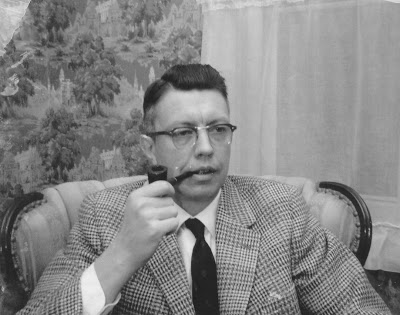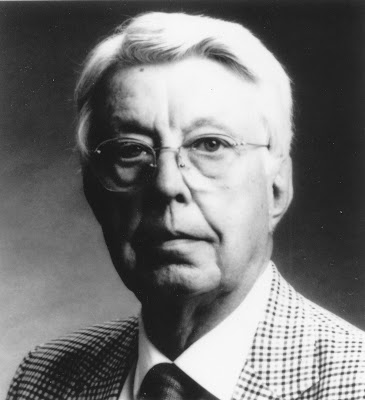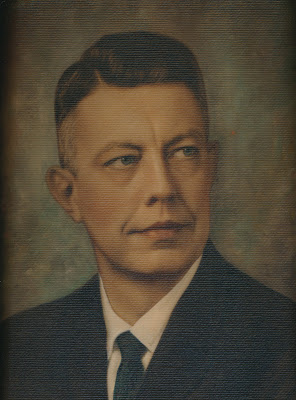Dr. Stephen R. Keister, 1921-2012:
Bon Voyage, Doctor Keister
By Thorne Webb Dreyer and Sarito Carol Neiman / The Rag Blog / April 12, 2012
It seems the cancer always wins! Tomorrow I go to the Manchester Presbyterian Lodge for final care by Great Lakes Hospice. I am beginning to hear the splash of Old Charon’s oars in the waters of the Styx. It ain’t all that bad with the memories of all of you fine folks to take along.” – Steve Keister, in a message to his friends and his colleagues at The Rag Blog, February 2, 2012
Dr. Stephen R. Keister left us late Friday night, April 6, 2012, after a long-running bout with prostate cancer. He died in hospice care in his longtime home, Erie, Pennsylvania, at the age of 90.
The cancer may have won but we seriously doubt that Old Charon, the ferryman of Greek mythology (who carried souls of the newly deceased into the world of the dead) succeeded in transporting Steve all the way to Hades.
Steve, ever the philosopher and the reformer, probably recruited the wizened old seaman to his own cause of universal health care and they’re out there now, organizing for a single-payer system in the Afterlife.
Steve Keister, who turned 90 last October, was a retired physician who practiced internal medicine in Erie, PA, from 1950 until 1991, specializing in rheumatology; he was the region’s first practicing rheumatologist.
He attended Duke University where he became interested in the writings and philosophy of Moses ben Miamon, Voltaire, and Sir William Osler. He obtained his M.D. from the University of Maryland and did his postgraduate training at the Mercy Hospital in Pittsburgh and Hamot Medical Center in Erie.
His medical honors were many and after retirement he remained active in scholarship and volunteer work. And Steve found a second passion late in life, dedicating himself to progressive social change, and especially to the cause of universal health care, working with Physicians for a National Health Plan and other activist groups, and writing about health care reform for The Rag Blog.
According to his daughter, Cindy Hepfer, “Steve has always been a voracious reader, continued to play tennis until his 60s when he took up golf instead, and enjoyed having friends in in the evening for drinks and conversation.”
And, “after retirement,” Cindy said, “Steve continued his family’s tradition of trying to preserve the tenets of the nation’s Founding Fathers by active membership in People for the American Way, Americans United for the Separation of Church and State, and Amnesty International.”
In a eulogy, Steve’s friend Don Swift said that Keister was not only a “gentleman scholar,” but that he was also “a mensch, a person of integrity and honor,” and that he was “all about trying to heal a broken world.”
Fellow Pennsylvania activist and writer Carl Davidson said, “We knew him well here in Western Pennsylvania, especially as an unwavering voice for Medicare for All, and then some. He supported PDA’s [Progressive Democrats of America’s] efforts here, but his own views were with the socialist left. Raise a fist and a red rose for him this May Day. He will be missed.”
About her father’s involvement with The Rag Blog, Cindy Hepfer said, “You have certainly given him a mission in these latter years of his life! I thank you for giving Dad a creative outlet and a way to share his goodness and intelligence with others.”
Keister’s heavily-researched opinion pieces published by The Rag Blog were rich with personal reference and backed up with facts, figures, and links. They were erudite, yet peppered with wonderful colloquialisms reminiscent of an earlier era, and always filled with quotes and observations from great thinkers, scientists, and philosophers ranging from Rabelais, Pliny the Younger, and Confucius, to Aldous Huxley, Sir William Osler, John Ruskin, and Will Rogers.
And, if you read a column by Dr. Stephen R. Keister, you never had any doubt about where the author stood on the subject.
Though always full of hope personally, Steve became increasingly disillusioned with the medical system in this country and the growing dominance of the pharmaceutical and health insurance companies.
In his writing, he often reflected on the lessons of a lifetime in medicine.
“I entered the practice of medicine in 1950, an idealist, believing in the lesson of the Good Samaritan,” he wrote. “I believed that all persons should be provided with medical care…”
But, “Somewhere in the 1980s medical care, with great planning and premeditation, was usurped by the health insurance cartel in collusion with the pharmaceutical industry. Medicine was changed from a proud profession to a business, and the physician degraded to a ‘health care provider.'”
In his final column for The Rag Blog, entitled “I Cry for My Country,” Dr. Keister wrote:
Having passed the age of 90 I wish that my final days could be days of happiness and good wishes for those about me; however, it appears that fate has ordained otherwise. It would be a great course of satisfaction to see an enlightened, progressive United States as a homeland for my grandchildren. Instead we find a nation that is descending into quasi-feudalism and subservience of the many to the few.
At the time Steve submitted his final column, we at The Rag Blog were aware of his worsening physical condition. We included the following introduction to his piece:
Our dear friend, Dr. Stephen R. Keister, turned 90 on Sunday, October 9. For the last three years Steve has written — with a unique and singular voice — dozens of columns about the sad state of our health care system. And in that time he has become the heart and soul of The Rag Blog. He claims this is his last column, but we promise not to hold him to that commitment! We hope he will continue to share his wisdom with us for many months to come.
But we knew it wasn’t likely.

Steve Keister approached death much as he handled life, with vigor, intellectual curiosity, and an open mind. According to his daughter, “He was analyzing the dying process for as long as he could and communicating his thoughts to those around him.”
“He had observed repeatedly to several of us that he was not afraid… and that he always liked to sleep.” Cindy said. “I told him how brave I thought he was and that he shouldn’t be afraid to reach out for the sleep that he wasn’t afraid of.”
We communicated with Steve during his final weeks and he shared his feelings and observations about the process of dying.
Saying goodbye
“Death is someone you see very clearly with eyes in the center of your heart: eyes that see not by reacting to light, but by reacting to a kind of a chill from within the marrow of your own life.” — Thomas Merton
“The greatest challenge of the day is: how to bring about a revolution of the heart, a revolution which has to start with each one of us?” — Dorothea Day
How do you say goodbye to a friend? We mean really goodbye — not “so long, see you later.” Saying goodbye, really, is an opportunity one doesn’t have often or early in life.
When we are young and a friend dies it is usually sudden, unexpected. One day the person is here, the next day that person is gone. And even when we know that death is coming, our culture as a whole does not tend to support the ceremony of saying our goodbyes while that person is still alive. Instead we are supported to remain in denial — “you can beat this thing, I know you can!”
We are encouraged in so many ways, subtle and not so subtle, to save our goodbyes for when it’s too late for the person who’s leaving to hear them. And by the time we are old enough to see (if we dare to look) the glimmer of our own departure on the horizon, we have no practice in saying goodbye, either as one who is leaving or as one who will remain.
Stephen Keister was a friend. His contributions to The Rag Blog over the past three years have been rooted in a rich lifetime of experience as a physician and proud “secular humanist” and, as such, his insights have been invaluable as we have collectively wrestled with all the implications of the crisis in health care that has plagued the United States now for decades.
His passion for his subject was not abstract or ideological; it was his very life. In his first Rag Blog column, published on Nov. 17, 2008, Dr. Keister was clear where he stood on the question of healthcare reform:
To take the burden off future generations this country must get in step with Western Europe in quality and extent of health care for all. According to the Commonwealth Fund our health care rates 26th in the world and as of Nov. 13 [2008] … U.S. patients, compared to seven other countries, suffer the highest number of medical errors. 44% of chronically ill patients did not get recommended care, fill a prescription, or see a doctor when sick because of costs. 41% of U.S. patients spent more than $1000 in the past year on out of pocket costs, compared to 4% in Britain or 8% in the Netherlands.
We must make sure our elected representatives are not taking baksheesh from the pharmaceutical and insurance industries and support single payer, universal health care devoid of insurance company participation. The nation and your family depend on you not sitting idly on your butt. Call, E-mail, demonstrate!
We lost that battle, obviously. But the war is not yet over, as the sad compromise that became “Obamacare” now finds itself in the Supreme Court. Steve Keister did not live to see the outcome of the current scuffle. But it’s clear, no matter what the outcome, there is still no cause for sitting idly by.

When we heard that it was time to say goodbye to our friend Stephen Keister, we wanted to find a way to honor the occasion. Not to respond with denial, nor to save all our tributes till after he was gone.
So we did what anybody might do if they just found out that a wise and beautiful friend was about to leave for good. We sent him a list of questions, hoping it would offer the opportunity to share what is happening with him now. True to form, he responded both as a scientist and as a humanitarian, the rare combination that has made it such an honor and privilege to publish him over the years.
Here is his response, in his own words. In a sense, this is Steve Keister’s final column. We would like to thank writer and educator — and Steve’s close friend — Don Swift, for facilitating our final communication with Steve Keister.
Recently I’ve received a request from Thorne Dreyer and his many friends at The Rag Blog, to give him some insight into the situation in which I am involved — that is, terminal cancer of the prostate, under the care of the good people at the local hospice organization.
Initially, I think we’d better discuss what hospice exactly covers. In my last article in The Rag Blog, entitled “I Cry for My Country,” I refer to several instances of hospices run purely for the financial benefit of the folks in charge. In other words, once again we are faced with the terrible American attitude of money above all else. Therefore, I would suggest that anybody who is interested in legitimate hospice care get a copy of the pamphlet entitled, “When Death Is Near: A Caregiver’s Guide.”
Hospice in the United States is a reasonably new organization, and the hospice in Erie was one of those founded on the basis of charitable giving. Some 25 years ago, Dr. David Dunn, a very capable general surgeon who had spent time in Great Britain during the war, became interested in the hospice movement and spent several months studying the technique as utilized in the U.K. Subsequently he came back to the United States and established a purely volunteer movement, which was soon overburdened, and ultimately taken over by his son, Dr. Geoffrey Dunn at the Great Lakes Hospice, where it remains today.
I became involved in this personally, having been diagnosed with carcinoma of the prostate some 12 years ago. This was treated initially by irradiation and subsequently hormone therapy. Approximately mid-2011, bone scans showed spread of the cancer to the various bones of my body. I tended to ignore this, which was possibly a mistake on my part, because of several factors. At the age of 90 I was enjoying the company of both the Edinboro University retired faculty group, and an 89-year-old lady, who was the best of companions, on the 8th floor of my building.
The question arises, why did I resort to hospice care?
I was not fully aware of the signs of the deteriorating effects of metastatic cancer. I was aware of the fact that we develop painful areas in the bones, but I completely ignored the systemic symptoms of the disease, which are: 1) increased fatigue; one will sleep up to 18 hours a night; 2) complete loss of appetite; one desires nothing, even a glass of milk, for a meal; 3) desire for solitude and lack of interest in things of everyday origin.
These taken together mean something to an alert physician and, happily, Dr. Jeffrey Dunn of hospice stopped by one evening to discuss books, and I discussed my symptoms with him. He said, “Gee, Steve, you’re a candidate for hospice care — your cancer is spreading.” So the next day I was a hospice patient, and have never regretted it to this day.
Hospice nationally will provide 90 days of care under Medicare. They do not provide inpatient care in a convalescent or nursing home, but otherwise, medicine, equipment, medical care, etc., is provided by the program. I currently am in the Presbyterian Lodge in Erie, and everything is going according to program. I realize I have not long to live, but realize too that I have much to be thankful for throughout my 90 years.
I am also asked how I have rationalized the facing of death, and the question mentions that Socrates, the Zen masters, Jesus, Buddha have all offered alternatives. However, I have somehow avoided these alternatives and looked at this as a purely biological process. We are born in pain, we live largely in pain, and hopefully we can avoid dying in pain.
I’ve been assured by several of the hospice workers that the easiest people to care for are those that are the “secular humanists” who approach each stage of life as a natural event and do not interfere or complicate matters with various philosophical pictures.
While is it true that good hospice care professionals, if possible, provide a role of helping family and friends come to terms with the impending loss of a loved one, some of us are beyond that stage. At the age of 90 we have few living relatives and depend entirely on friends. Happily, I have been blessed with many, many friends in my recent lifetime — perhaps more so than earlier in my life.
The final question in the submitted list is very interesting and very apropos to the present time. It is: If you could make a new Hippocratic Oath for the 21st century to be given to every student graduating from medical school, what would it be?
This I have given much thought, and do not feel intellectually qualified to answer this at the present time. But I do feel that certain factors should enter into the situation. I do think the philosophy of Dorothea Day and Thomas Merton should play a big part, and within their thinking, we who allegedly feel we are Christians should remember the Sermon on the Mount and the Beatitudes.
In addition to that, from the ethical standpoint we should remember the teachings of two physicians of the last century: Sir William Osler and Dr. W.W.G Maclaclhan of Pittsburgh, both of whom treated people of prominence, the well-known, but at the same time never turned their backs on the poor, the underprivileged or the disabled.
I once again wish to thank my friends in Austin, Texas, my friends in my retired professors’ group in Edinboro University, my children, including my daughter Cindy and son-in-law Will (both librarians), and my grandson Jonathan and his wife Alice (both modern musicians with a technique I do not understand but in which apparently they are doing great work). And finally, my dear friend on the eighth floor at 1324 South Shore Drive.
Peace. Peace to all. Thank you.
More of Stephen Keister’s last words can be found in his last columns for the Rag Blog. His final column ended with a challenge for us all to carry on the work of birthing a better world:
I cry for my country, and while asleep I hear in my dreams the mass gatherings of my youth singing, “Arise ye prisoners of starvation, arise thee wretched of the earth, for justice thunders condemnation, a better world’s in birth.”
Bon voyage, Doctor Keister. You will be missed.
[Thorne Dreyer edits The Rag Blog, hosts Rag Radio, and is a director of the New Journalism Project. He lives in Austin. Sarito Carol Neiman is a freelance editor, author, and actress who lives in Junction, Texas. Together they edited Austin’s Sixties underground newspaper, The Rag.]
Find articles by Dr. Stephen R. Keister on The Rag Blog.
The Rag Blog




















Thank you, Sarito and Thorne, for a marvelous tribute to a remarkable man.
This was an excellent tribute, as befits an excellent human being, Steve Keister. Robert Cogan